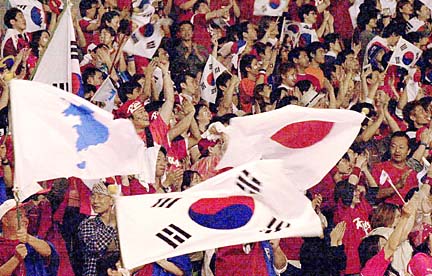


The Rising East

|
Koreans still find it
difficult to be good
sports about JapanThe World Cup soccer tournament jointly hosted by South Korea and Japan closed today without having noticeably eased the century-old animosity between the neighbors in Northeast Asia.
There were a few signs of goodwill, such as Japanese cheering for the Korean team after their own team had been eliminated. Underneath, the grudges, particularly among the Koreans, remained.
Indeed, it is no longer pertinent to write in an even-handed manner about the antipathy between Japan and Korea because most of the ill will is found in Korea.
This is a lopsided, asymmetrical relationship. The palpable Korean hatred for Japan is deep-seated, pervasive and obsessive. Koreans who are rational about everything else can become irrational when Japan comes into a conversation. In contrast, Japanese often ignore Koreans or are indifferent to them -- infuriating Koreans even more -- although some younger Japanese profess to be interested in Korea.
The conventional explanation for Korean antagonism is Japan's harsh colonial rule of 1905-1945. That, however, doesn't explain why Korean anger has lasted longer that the colonial period itself.
Something deeper and hard to discern is at work here. Trying to psychoanalyze an entire nation is undeniably risky but may be permissible when applied to Korea's tightly knit society.
Koreans have long had difficulty in dealing with outsiders, partly because of the geographic isolation of the Korean peninsula. It is, American GIs once said, tucked into the upper left-hand corner of the world.
More comes from having been overrun and subjugated for centuries by the Chinese, Mongols and Manchus, which led Koreans to draw back into the Hermit Kingdom and try to fend off foreigners. That lasted until the mid-19th century when Western nations demanded that Korea open up.
Then the Chinese, Russians and Japanese fought over Korea, with the Japanese winning out and seeking to absorb Korea into the Japanese empire. All of this seems to have bred xenophobia into Korean society, the Japanese being the latest target.
Korean antipathy showed up in myriad ways during the World Cup. Most Koreans resented having to share the spotlight as host with Japan and insisted that the tournament be called the Korea/Japan rather than the Japan/Korea World Cup. Korea's Web site and publicity largely ignored Japan. Japan was rarely mentioned in Korean TV coverage.
When Turkey defeated Japan to eliminate the Japanese, Koreans applauded. When Japanese cheered for Korea as the Korean team advanced, Koreans said: "They Japanese are faking their support for the Korean team."
There was evidence that the support was not faked. A professor in Japan asked over 100 of his students what they thought of the Korean performance in the tournament. About 70 percent gave positive replies, 22 percent were negative, and 8 percent said they weren't interested in Korea.
A Korean-American who lives and works in Seoul said privately: "Koreans are taught by their grandparents, parents and the educational system that the Japanese are evil. Hear this every day since birth and you have a running experiment of a Brave New World."
He said he had found an "enormous insecurity/inferiority complex" among Koreans. "They do not like the fact that their economic and political status in the world is inferior to that of Japan and the United States. They do not like the fact that nobody in the world really pays attention to them. They do not like the fact that they are not a power in the world."
"Korea," he concluded, "is still a nation learning to deal with its economic, political and cultural development."
Some weeks ago, at a gathering of Korean, Japanese and American strategic thinkers at the Pacific Forum, a research center in Honolulu, the discussion anticipated the World Cup. The Koreans berated the Japanese, the Japanese sought to defend themselves as not being anti-Korean, and the Americans deplored the hostility between their two main allies in East Asia.
"Today," lamented an American experienced in Asia, "what ought to be a natural strategic relationship between two geographically proximate, liberal democracies with common allies remains problematic because of history.
"If ever there was a issue that cried out for decisive, assertive U.S. leadership," he concluded, "it is the issue of knitting together a sustainable virtual alliance among the U.S., Japan and Korea."
Richard Halloran is a former correspondent
for The New York Times in Asia and a former editorial
director of the Star-Bulletin. His column appears Sundays.
He can be reached by e-mail at rhalloran@starbulletin.com